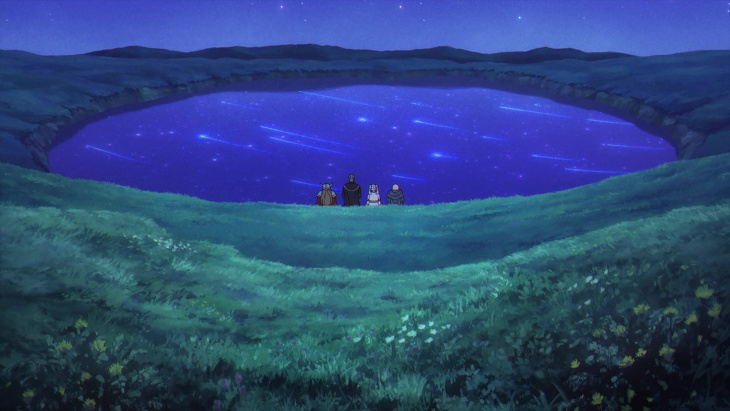
“Tearful goodbyes aren’t our style. After all, it would be embarrassing when we met again.”
As an anime, Frieren: Beyond Journey’s End has an interesting distinction going for it. As it ran through both the Fall and Winter seasons, it may simultaneously be the best anime of both 2023 and 2024. The competition was simultaneously strong and not even close, and the only reason I said it may be the best of both years is that 2024 isn’t even close to over yet. Still, it would take a massive upheaval to dethrone Frieren. Frieren isn’t just my favorite show of last year. It rapidly became one of my favorite shows of all time. It’s not uncommon for a show to come across as poignant during its early episodes, but lose that spark as it goes along. However, Frieren had a constant flare which never dwindled. In a genre that has become awash in isekai-titles or game-mechanic-based narrative shortcuts, Frieren: Beyond Journey’s End was willing to commit earnestly to constructing a detailed fantasy world filled with mysteries and wonders. Even when the world occasionally comes across as immersed in standard fantasy tropes, the series’ unique narrative focus and fully realized characters consistently breathe life into it. There are times when you love a show, but wonder if you’re going overboard in your praise. Then there are the shows where you don’t care, because whether it ultimately clicks with them or not, everyone should give Frieren a chance. It’s that good.
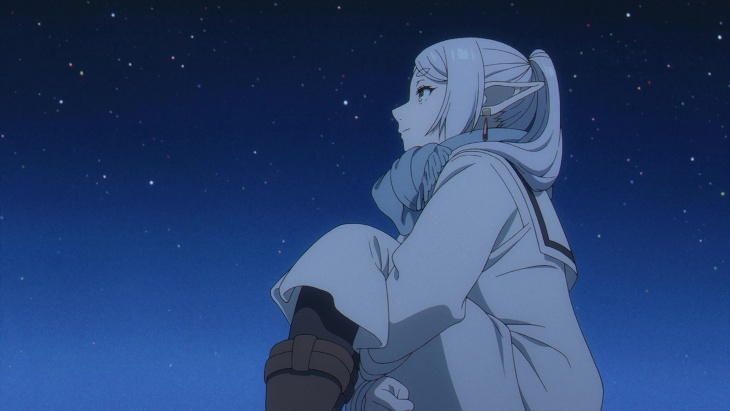
The show follows our titular immortal elf, Frieren, in the aftermath of her adventuring party’s victory over the Demon Lord. Frieren has lived amongst humanity for ages, but always apart, so she’s startled to find herself impacted by the “mere” decade-long journey she had with her compatriots. When the inevitability of time eventually leaves its mark on her former companions, Frieren is forced to come to terms with her place in the world and explore new ways to connect with it. While my first impressions review from last year only covered the first episode, it’s understandable why the first four episodes were released all at once. Even if you set aside the fact that it enabled Frieren to have an irregular season length of 28 episodes, it also allowed time for the primary “goal” of the series to be revealed. There is something oddly novel about that. Most series of this sort start off with our protagonists either knowing what they plan to do, or discovering it during the course of the premiere. By the end of their premieres, the Elrics were already seeking the Philosopher’s Stone, Eren Jaeger already wanted to destroy the titans, and Kiryu was already on the path to having every woman fall in love with him despite a chronic lack of personality. The goals may change over time, but the initial objective is usually present and discernable from early on. In contrast, Frieren’s goal of connecting with humanity is rather nebulous and it isn’t until the end of that fourth episode that she is given a specific quest to undertake.
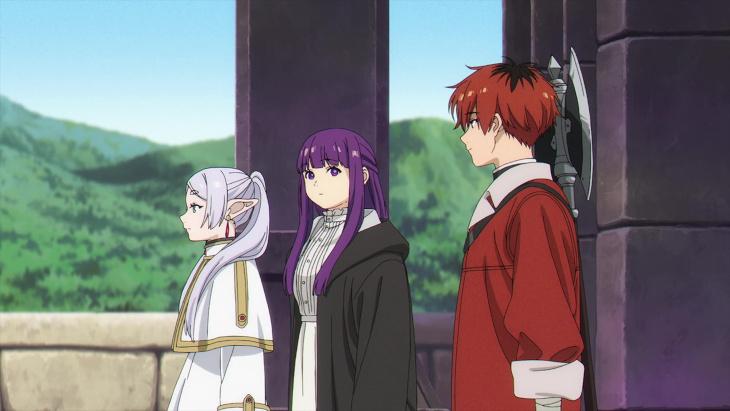
Frieren’s quest sees her moving from location to location both encountering a variety of people, and sometimes being joined by them. It reminds me of One Piece in that regard, as both series feature arcs that are defined less by limited short term goals and more by the nature of the regions our characters visit. Frieren is joined on her journey by the young mage Fern, whom she effectively raised, and the warrior Stark, an apprentice of the warrior from Frieren’s previous adventuring party. The pair serve dual purposes from a narrative standpoint. They can be audience surrogates for aspects of world-building, and they ease the process of engaging Frieren with the people around her, as often they are the ones to step in and involve themselves in local developments. This is a handy way to bypass Frieren’s indifference. However, I don’t mean to imply that they don’t work as fully fleshed out characters themselves. More so than the lore, narrative, or animation, it’s the characters that truly elevate Frieren: Beyond Journey’s End to the level of masterpiece. The show is always ready to explore new depths with each of its characters, whether they’re part of the primary cast or just a one-off stranger who is only showing up for a single episode. Even a story that could easily serve as a flimsy rationale for a tournament arc in a lesser franchise, instead turns into a existential breakdown of a suite of participants and their outlooks and philosophies.
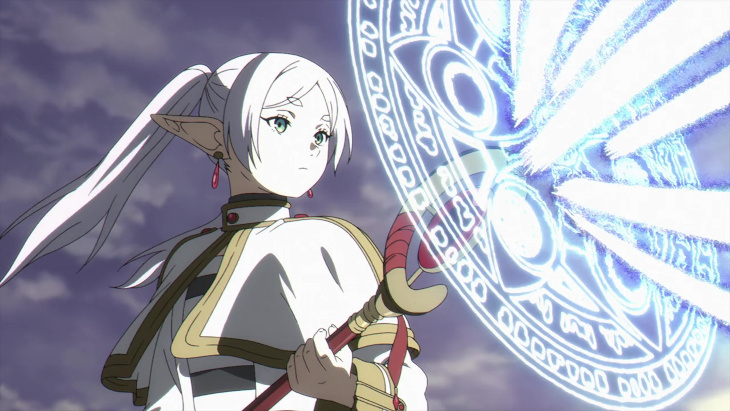
All of this is anchored by Madhouse’s impeccable production. Poor visuals won’t necessarily ruin a good narrative, but the only way to get a proper masterpiece is to have all aspects elevating one another. As much as I may praise the characters, dialogue, and storytelling, there are moments where arguably nothing is happening and yet these interludes can take your breath away. Madhouse’s attention to detail ensures that the world always feels like a living breathing entity where everyone in it has a life of their own. That’s all impressive, but their capabilities extend well beyond simple consideration of tone and lore. The series doesn’t rely heavily on action, but when it does it turns into a glorious onslaught of sakuga. However, as much as the visuals might capture one’s attention, special praise is warranted for Evan Call’s awe inspiring soundtrack. From symphonic Celtic-inspired tracks that compliment the rolling fields to dark epic builds that sound like the love child of Danny Elfman and the Skyrim soundtrack, everything about the score is pitch perfect and honestly, I rarely do this, but I might spend some time listening to it on its own. The openings and endings were also among my favorites of each season. The first OP was subject to some criticism, as a subsection of the fandom felt it was too fast paced for the show, but I loved it, and I still feel it fits, as the distorted vocals and the lyrics both carried an appropriate sense of melancholy.
Before I wrap up, a few Notes and Nitpicks:
- I don’t know what it is about the first OP that really gets to me, but it’s actually the point where the music starts to speed up (around 58 seconds in) that makes my heart ache. Even before I had seen a single frame of the show proper, that OP convinced me I was in for something special and that instinct was never proven wrong.
- I know Evan Call worked on Violet Evergarden’s soundtrack, and I’ve heard good things about it. If I get an opportunity, I’ll try to fit that into my schedule in the future.
- The manga is still ongoing, so it’s not exactly surprising that this season doesn’t have a full conclusion, but this is one of those rare shows where, even if it never gets another entry, it can stand on its own and an open-ended finale does nothing to diminish its quality or significance.
- A little over a year ago, I referred to Mob Psycho 100 as being one of the greatest anime of all time (It occurs to me that I’m actually wearing a Mob Psycho T-shirt as I write this… My day job has a forgiving dress policy most of the time), and now I find myself applying the same terminology to describe this show. The show is still fresh, so I don’t know if I’m comfortable ranking it, but there is a chance this is my favorite anime period.
- I normally avoid seeking out reception on titles I’m reviewing, but during the course of updating my personal MyAnimeList, I caught sight of Frieren’s current ranking at #1. Despite my immense praise for the show, I’m still impressed, even if it’s likely to drop down some over time.
Frieren is the type of series that feels transcendent. It is the type of series that I didn’t know I wanted until it was here, and I’m so glad we got it. Frieren: Beyond Journey’s End is a revelation, and if you haven’t checked it out, you owe it to yourself.

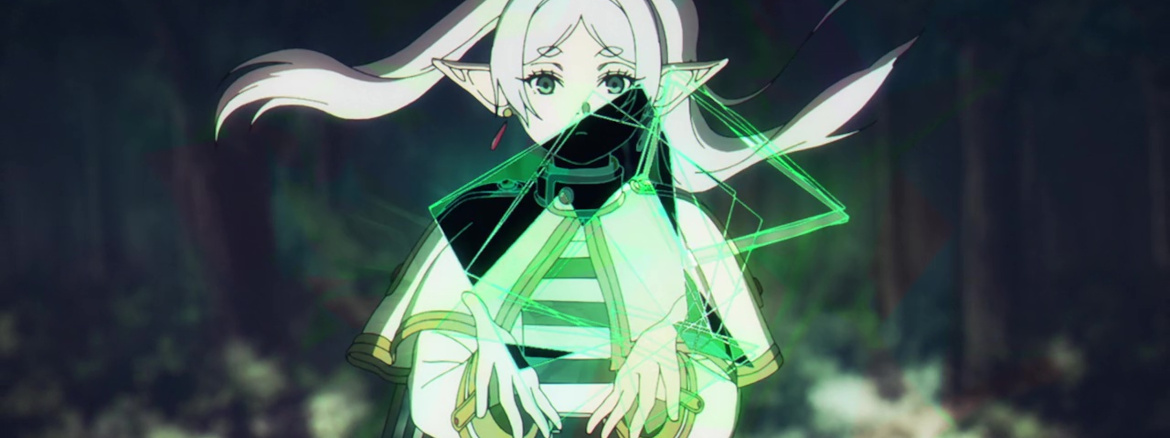
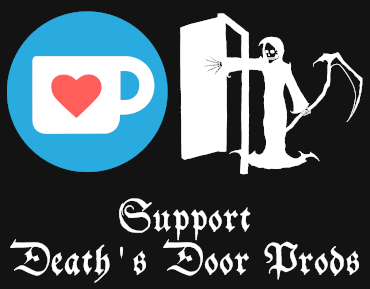


Add comment